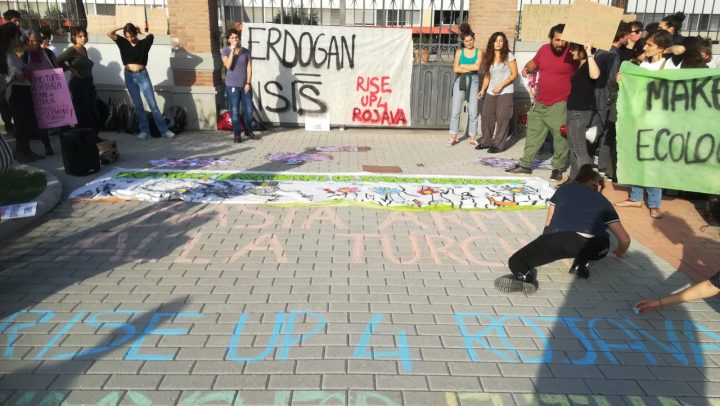Wars are waged to get hold of oil reserves and then that oil is used to carry out other wars (world emissions from military equipment amount to 15% of total emissions, but are not accounted for in the Paris Agreement). Wars produce refugees and in order to push back the refugees further wars are started, as happens today in Rojava.
Oil and fossil fuels imprison the whole of humanity in a dependence on wars, which are nowadays a permanent element of the human condition. Refugees and migrants force governments and peoples who do not want to welcome them into the dependence on gangs and rogue states in charge of “keeping them away”. With the attack on the Rojava region in Northern Syria, the subordination of the European Union towards Turkey became evident in all its deadly consequences. It had already emerged clearly in 2016 at the conclusion of the Merkel-Erdogan agreement. The “migration policies” of the various Italian governments that succeed each other, and with it that of the whole of Europe, have been put into the hands of criminal gangs (the 21st century kapos), free to practice slavery, extortion, assaults, destruction of the dignity and lives of others, as a compensation for the task assigned to them.
It is difficult for all the governments of the European Union to resort to the excuse that “we didn’t know”. The war on the Rojava region brings Europe and its peoples closer to the truth: that it is the extermination of desperate and scattered people who are trying to defend their own borders, that is, their own way of life. But the meaning of those policies is: “Let us eliminate them all”.
Vittorio Feltri, among others, expressed this clearly in the Italian newspaper Libero on the 12th of October: “The problem is simpler than it appears: if we stop saving those who take the sea, sooner or later they will stop venturing into the waves, and this story of the invasion will end immediately”. Feltri writes it and Europe carries it out, but leaves it to those like him to express it. But it doesn’t work. Departures from Libya don’t diminish even when there is no one at sea to save the shipwrecked and many of the refugees and migrants who manage to reach Italy do so on their own, on makeshift boats. What do you do with them, Mr. Feltri? Do you want to kill them on the shore or push them back to sea to let them drown? On all those who say they are against the criminal policies of rejection, but then repeat, invoking the “common sense” that “we cannot welcome them all”, hovers a hypocritical silence, because in this alternative there is no middle way: Tertium not datur.
Since the topic of migrants has become the number one issue in the whole of Europe, this (and not the deficit or the debt) is also the question on which the subalternity of our country towards the other partners of the European Union manifests itself most. The other countries are very happy to show indignation when Italy, as Salvini did, takes on the role of killer on their behalf, but nevertheless are determined to make our country become the deposit of the many desperate people who are no longer allowed to cross the Alps. Summits and promises are made, but the Union’s policy doesn’t change. If it does, it gets worse. And for Greece, whatever happens, it is and will be worse still.
It is useless to play the victim (of an unfair policy) or the supplicant (of a fairer distribution of the migrants who arrive) and even less to exchange this subalternity for some concession on the deficit. Europe’s migration policy must be overturned from the ground up with a proposal that removes first the stigmata from migrants to be an unsustainable burden. The climate and environmental emergency offers us the opportunity. Austerity policies must be abandoned: they are incompatible with ecological conversion. This requires a major investment plan providing a framework and support for millions of local projects which deal with the transition to decarbonized energy, production, crops, mobility and territories: a Green new deal that acts as a driving force for all other regions of the world, but the protagonists of which cannot be primarily only governments and enterprises, because it requires above all an active role of people, their associations, their communities and their conflicts. The only alternative is a race towards the destruction of human life on our planet (and there are no other planets).
The project of a Green new deal that is at the centre of all the demands of social movements acting today to impose a radical change in climate and environmental issues and that will be more and more numerous as the climate situation will deteriorate, requires the creation of millions of new jobs at all levels of qualification. This process can also include hundreds of thousands and, in the near future, millions of migrants and refugees, along with unemployed, underemployed and precarious natives, and those who will lose their jobs in productions to be closed down, starting with those of weapons. We have to make immigrants become citizens of a large community that unites countries of arrival and countries of departure and in which all, natives, migrants and newcomers, can fight together for the pacification and recovery of regions devastated by climate and environmental policies, by the plundering of local resources, by wars.
The mobilization in support of the people of Rojava alongside the Kurdish communities throughout Europe and the endorsement given to it by movements fighting for the environment and ecological conversion show us how to jointly address the issues of climate change, social justice and migration.
Translation from Italian by Thomas Schmid










